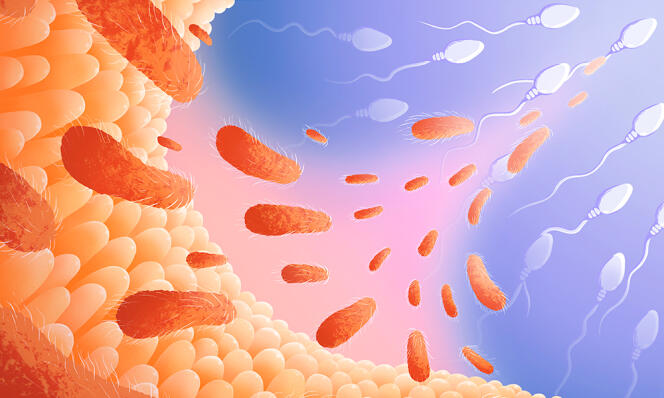


The intestinal microbiota is still a hot topic. According to PubMed, some 5,000 studies have been published on the subject since the beginning of the year. These studies focus on the vital role played by the billions of bacteria and fungi that inhabit our intestines. Essential for digestion, they are also integral to our immune system. Some studies have even highlighted their close links with our brain, to the extent that disorders in the gut flora can be at the root of mental illnesses such as depression.
What if the intestinal microbiota were also involved in reproduction? A study carried out on mice by a consortium of researchers from the European Molecular Biology Laboratory (EMBL) in Heidelberg (Germany) and Rome suggests this. Published on April 1 in the journal Nature, the study demonstrates that a disturbance in the gut microbiota of male mice influences their offspring's health.
In other words, as surprising as it may seem, the microbes in a male mouse's gut can have an influence on the offspring even though they develop in their mother's womb. The study is conclusive. Researchers administered antibiotics to male mice which greatly reduced the number and diversity of microbes in the rodents' intestines. These males, termed "dysbiotic," were then crossed with female mice with a healthy microbiome. After 20 days of gestation, the effect was undeniable. Pups from dysbiotic males were more often affected by developmental delays and their mortality rate in the two months following birth was markedly higher.
"We've managed to prove that changes in the paternal environment during reproduction can have adverse effects on offspring," explained Jamie Hackett, the study's lead author. The researchers were interested in the role of the intestinal microbiota because it is a true amplifier of environmental disturbances. "We often investigate the impact of dietary changes or exposure to various agents. However, more often than not, the result is the same: the alteration of the intestinal microbiota. By disrupting it, we capture the effect of many environmental changes."
What's even more surprising is that this effect is reversible! In some cases, the researchers waited a few weeks for the males in their experiment to regain a healthy intestinal flora, then had them reproduce. The results showed no abnormalities detected in the offspring. The mice displayed no growth retardation and were no more likely to die in their first months.
While the impact of male mice's microbiota on their offspring has now been proven, the process remains to be understood. Scientists initially looked into the possibility of contamination. The males' defective microbiota might have contaminated the female or the offspring, leading to growth problems. However, this was not the case: Unlike that of the male parent, their intestinal flora was perfectly healthy, meaning the solution had to lie elsewhere. A detailed examination of the rodents' reproductive systems enabled the researchers to find the answer: They observed significant hormonal and metabolic changes in the dysbiotic males' testes. They also detected some changes in sperm chemistry. "We've demonstrated that there is a communication pathway between the gut, its microbiota and the reproductive organs. In this case, the testes," said Dr. Hackett. This is the first time that such a connection, which they called the "gut-germline axis," has been demonstrated. The study's authors even produced a short video to explain their findings.
You have 34.83% of this article left to read. The rest is for subscribers only.
